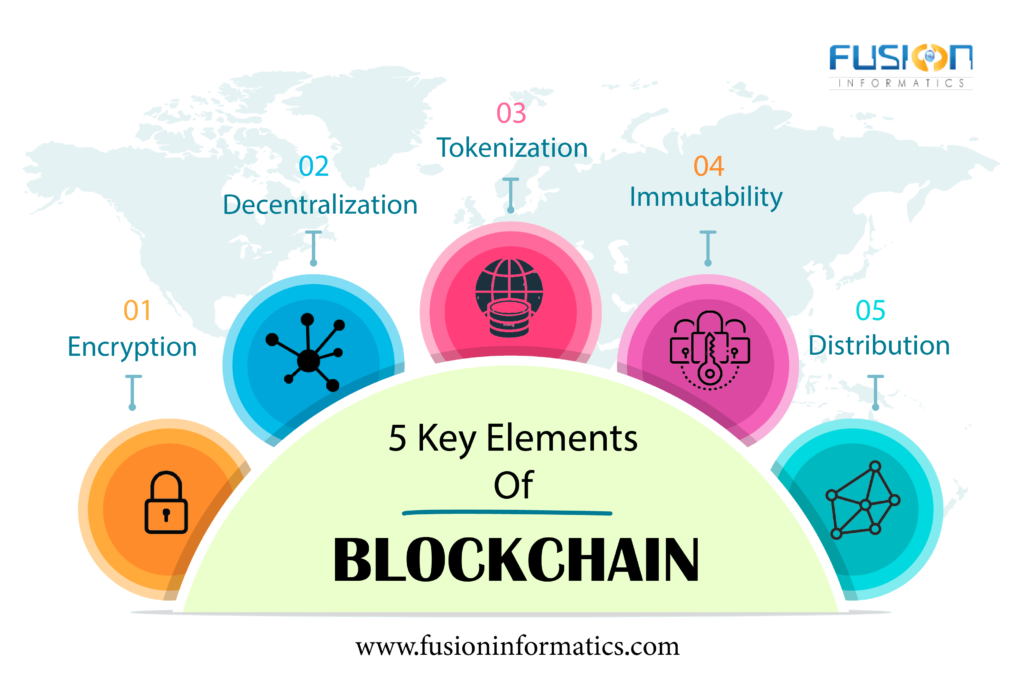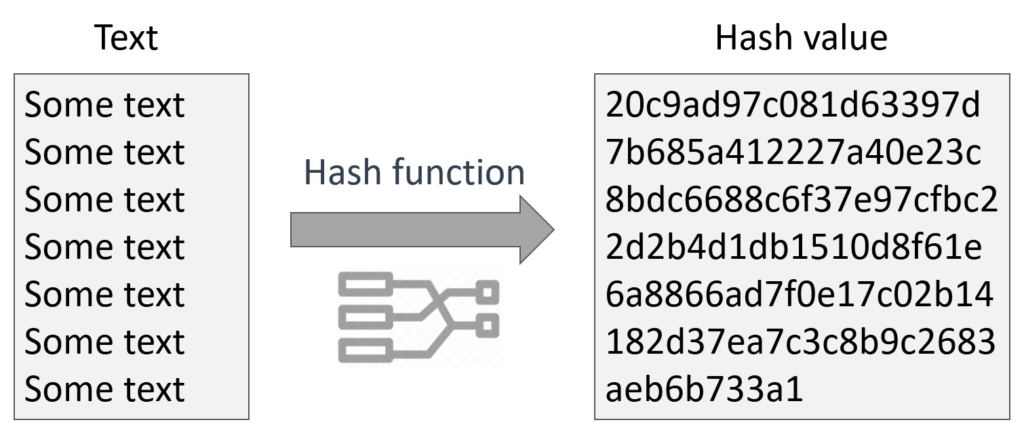
Blockchain incorporates existing digital technologies & techniques that include asset tokenization, distributed digital ledgers, immutable records management, encryption, and decentralized governance for capturing/ recording information that participants or users need for interactions and transactions over a network.
Blockchain does not involve any intermediary such as a bank, to validate and protect the transactions being done. Blockchain development is the new-age mantra for companies globally to meet business goals.
With its decentralized nature, Blockchain is becoming the mainstream technology empowering varied applications and possessing massive use-cases across industries. The only technology that can guarantee ‘ trust’ in the ecosystem.
Businesses are increasingly adopting Blockchain technology worldwide, integrating it into the existing model, or completely recreating a new one focusing on Blockchain capabilities. However, there’s been a huge demand-supply gap. Blockchain development is the need of the hour.
Let’s go bit-by-bit and understand the basic terminology of Blockchain technology, its massive capabilities, and how it impacts businesses across industries the world over. A complete guide to Blockchain development!
In Short –
- Blockchain digital technology enables businesses, people, and machines, who may or may not know each other, to conduct varied monetary transactions, exchanging information, and assets with each other without the involvement of any intermediary. In short, the technology enables all of them to exchange value in a digital environment and there’s no need for third-party involvement or negotiator, just the two or more entities, on a direct basis
- Blockchain is a kind of digital ledger or distributed ledger, and today, varied Blockchain solutions are continuing to mature unabated, for example, in terms of scalability, and are expected to underpin, and support entirely new business models, social and economic models that will ultimately redefine the society we live in.
- Complete Blockchain technology combines 5 design elements for authenticating users, validating varied transactions while recording information to the ledger, and all of these are done in a way that cannot be changed and corrupted at any time, later. Once done, cannot be undone, to be clear in terms of Blockchain’s secured transaction model that is corruption-proof, and no mediator is needed.

Why BlockChain Development for Companies
If you are an organization from just any industry, Blockchain-inspired record management, and secured transactions without involving a third-party mediator that can lead to huge cost-saving potential, are a few reasons you should think about Blockchain development to propel business growth. Be it the banking sector, healthcare industry, retail management, fintech, real estate, and others, blockchain such as cryptocurrency is increasingly revolutionizing respective eco spaces.
Mobile payment solutions, healthcare apps, retail apps, mobile banking solutions, etc. are highly incorporating the Blockchain capabilities, globally. You must consult a dedicated web & mobile app development company that can guide you regarding blockchain development and your project requirement, viz., Ethereum development, cryptocurrency wallets, hyper ledger development, smart contract, your internal/private Blockchain like Quorum development that allows private transactions, NEO, EOS, Qtum, TEzos, and so on.
Startups, SMBs, and enterprises across the globe are taking a keen interest in adopting blockchain for their businesses, thanks to the technology that can record, store, and move any sorts of assets, and transactions in a decentralized manner with great ease and perfect automation. Multiple use-cases and applications of Blockchain technology in multiple areas across the business framework are catapulting industries to invest more and more in the technology concerned!
Why the Name ‘Blockchain’
Blockchain allows varied transactions, like transactions of money, information, assets, etc., and these transactions are grouped in blocks. As they are grouped in blocks, they get recorded one after the other, in a chain of blocks. That’s why the name Blockchain is kept.
The links that connect blocks with their content are secured, protected purely by cryptography, and this prevents previous transactions from being forged or destroyed or changed. Secured authorization access is guaranteed! Without any middleman or the mediator or the central authority, the ledger, or the transaction network is trusted because of the authenticity that the Blockchain development provides to entities involved.
Types of Blockchain
There are two types of Blockchain and the very types determine who can participate within a Blockchain network.
These two types are – Public & Private blockchains.
Public Blockchain
In the Public Blockchain network, all participants have access to the network that can take part in the consensus. Anyone who has internet access can join this type of Blockchain network. There’s no onboarding requirement and as a user, you just don’t have to ask anyone for joining permission.
In fact, there’s no single authority on this network type and is decentralized in nature. All transactions done over a public blockchain are visible to every node present on the very network. For example, Bitcoin is a public blockchain network, and transactions done over it can be viewed by anyone. Using a block explorer, you can view all the latest bitcoin blocks and transactions done so far.
Private Blockchain
The private Blockchain network assures one thing – your privacy. There is inbuilt trust amongst participants in the very blockchain network. The participants who are invited to this blockchain network can only access the information stored therein. Private Blockchain Networks are considered semi-trusted networks.
In this type of blockchain, all participants mutually agree upon using blocks, and how to leverage the blockchain capabilities. For example, Consortium Blockchain is a private blockchain network that allows users to leverage its capabilities by evenly distributing authority to participants and that can act in the best way possible benefiting those in the network.
There exists transaction privacy from the public glare. Consortium Blockchain (a private blockchain) can even restrict the authority to participate in consensus. This blockchain type can enforce trust by restricting participants, allowing them just to involve invalidation. These groups of participants are known as consortiums. Then, data privacy is greatly maintained under this blockchain type.
Blockchain Protocols for your Custom Solution
There exist varied Blockchain protocols but the most well-known cryptocurrency protocol is Bitcoin. The network of Bitcoin blockchain was developed for Bitcoin cryptocurrency. The main function that the Bitcoin blockchain network does is to store Bitcoin value. And Bitcoin values can be transferred from one to another and in a trustless manner!
The Ethereum protocol is a general-use blockchain protocol. Ethereum takes forward functionalities/functions that had been created by the Bitcoin cryptocurrency towards the provision of a protocol that would facilitate the writing of smaller programs, as well as simple value transfers! The core of Ethereum is its effects and the ability to add logic as well as codes instead of mere simple fixed value transfers!
As a technology guide, we’d recommend you adopt a general use blockchain protocol such as Ethereum or Hyperledger fabric. These two protocols can help you leverage the best blockchain capabilities for your custom blockchain solution. They are programmable blockchains, have multiple use cases, and can be used for several scenarios. Ethereum protocol and other types of general use protocols, use, and apply smart contracts, that allow them to encode business logic and state.
Blockchain – How Does it Work
So, how does blockchain work behind the scenes? We will see in-depth detail:
- Data Distribution – How Data is Distributed?
In a scenario where multiple companies are involved, it’d be so easy to build a centralized database system. But what if no company wants to be the central authority and take accountability for database management? In that case, we use a quality blockchain distributed ledger. Why so? Because using a blockchain ledger does not require any central authority.
It removes this requirement from the scenario. Moreover, a distributed ledger system allows all participants who are having blockchain nodes, to have a copy of that ledger so that they can perform custom auditing matching their unique requirements, and integrating them with their respective systems. Usually, it is not necessary that each company/participant should have a separate node of its own. They can share nodes between themselves as per mutual understanding and get the work done appropriately.
It works the way that using a blockchain network, each node gets connected to other nodes. One-to-one relationships of these nodes with participants or companies are not necessary.
- Changing the State of Data in Blockchain
Data in a blockchain network represents its state. This is the reason why digital tokens such as cryptocurrency fit in a blockchain environment. For example, when we talk about physical coins/currency, its ownership changes with every owner it has. A person having a coin in his pocket is considered the owner of that coin. And as that coin moves to other pockets, its state of ownership changes accordingly. Thus, to change the data state from one value to another, Blockchain uses certain transactions to do it.
The very digital technology sends a particular transaction across the blockchain network and each node gets one copy of that very transaction.
The blockchain that sends the transaction throughout a network is copied to all node peers of the blockchain participants. Thus, despite each node now processing the transaction, it needs a validation process by adopting a consensus mechanism. And why the consensus mechanism? It enables a certain amount of consistency, as well as trust for the very distributed ledger managing database.
- How to Trust the Consistency Aspect of Ledger Data
It is not easy to determine what is true when data changes so frequently over a distributed network. These changes should occur throughout all the nodes.
Blockchain technology adopts a consensus mechanism for validation, to agree on the data across all these blockchain nodes. A consensus mechanism used by blockchain provides a platform over which all decentralized nodes are converted to the same state.
During the transfer of responsibility, any value, it is the order that matters. The consensus mechanism ensures the correctness of the order of multiple transactions while maintaining the integrity of the blockchain network. During this process of consensus mechanism, a transaction group is validated in the form of a block, and participants in the blockchain network must agree to allow that block to be included in the very network.
As of today, there exist varied blockchain consensus algorithms. That includes proof of work, proof of authority as well as proof of stake. Each of these algorithms has a different approach to solving consistency matters. In short, the very consensus mechanism facilitates a situation where the distributed ledger arrives at a common state, getting consistent with each other.
- Block – What is its Meaning?
A block in the blockchain network is a cluster of data that is responsible for storing transaction information across the network. The number of transactions happening in a block is purely time-based. It tells you how many transactions occurred, say, in the last 10 minutes,20 minutes, within a block.
Based on the consensus mechanism, blocks that are validated are automatically added to the blockchain at every node. And since all the nodes in the network have the same blocks in the chain, the ledger maintains a complete consistency. Consequently, all the nodes consist of the same and common validated data now. Data consistency is accurately maintained.
- How to Trust if Ledger is Immutable?
So, if you think that you can change data if it is in your node, you are wrong. Because data is immutable here. How?
To create a link between blocks, blockchain technology uses a cryptographic hash. This way, the order of all transactions occurring can be agreed upon using the consensus mechanism(its algorithm).

What is a cryptographic hash? It is also an algorithm. It is assigned to map data of arbitrary sizes and make them a bit representation of the fixed sizes. It is just like a digital fingerprint. For instance, the Bitcoin cryptocurrency uses an algorithm – SHA-256 hash. If you have performed any function using an SHA-256 hash algorithm on a 100-page document, a 256-bit hash value will be the function output.
And when you change even just one character in that document and then regenerate the hash, a different 256-bit hash value will be the output. So, what would it be like when you use a block as an input to the hash function? The output that you get will be an entirely unique hash value for the data in the block.

To detect changes made to the blocks, if any, Blockchain uses hashes only. It includes the hash value of the previous block while generating the hash value for the next block. This way, through hashes, all the blocks are chained together!

Thus, using blockchain technology, trust is guaranteed. The very digital technology assures 100% trust just by using hashes. This way, it is sure that data records and history have not changed at all. That data has not been altered by any means. An immutable chain of transactions is created in order by including the previous block’s hashes while creating a new block.

Data is immutable and is guaranteed based on hashes. In the chain, if any modification/change is being done with any block, the upcoming blocks/later blocks will show a different hash. And discrepancy will be discovered via the validation process.
- Trusted Logic at Each Node
Storing data over a blockchain network is a trusted practice that you should know now for your business returns. The major reason behind your decision for blockchain development could be trusted data storage and data security. Blockchain technology allows you to store data in a consistent and trusted manner.
And you can apply this at each of your nodes, you can add logic that is executable at each node in the same form. There exists a logic that facilitates a seamless transfer of responsibilities of the product amongst participants. Application on a distributed computing system is called DApp (decentralized application).
Ethereum Dapps are known as Smart Contracts. A smart contract is composed of logic that is run and executed as a mandatory part of any transaction happening. Over Ethereum, you adopt a programming language called Solidity, and this language is used to create your program logic over the Ethereum network.
So, how does it work?
When you use a smart contract, you are creating an instance. Smart contracts are referenced using an address when they are being deployed to the blockchain network. A smart contract instance carries program logic and state data.
A transaction is executed when a product responsibility is transferred to another party. Worth noting is that the smart contract logic is executed at each & every node! Also, Smart Contract is immutable just like data in the blockchain. No changes can be done once data enters the network. It means that once deployed, you can not change the logic of your smart contract. That’s why, smart contract logic is so trustworthy across the network, as it always executes the same on all nodes. If any code change is required, you need to deploy an entirely new smart contract at a new address!!
Why Choose Blockchain Development
Blockchain technology assures immense security for your data across industries. In the present surge of cyber threats and hacking software, blockchain comes as a big relief to businesses on a global platter. B2b,b2c, Start-UP, SMB, or an enterprise, blockchain development is the need of the hour. The blockchain development solutions & services lead to the creation of decentralized blockchain networks and this provides massive security and traceability of innumerable data and transactions from time to time.
A reliable web & mobile development company can help you develop a quality blockchain solution matching your business needs. The company can even guide you on whether you need a custom blockchain solution or need end-to-end blockchain application development services for desired outcomes. Blockchain development for your organization will lead you to leverage the best use cases offered by the very digital technology.
A typical blockchain solution supports:
- Supply Chain & Logistic Management
- Health Record Management(EHR)
- Financial Transaction Management
- Insurance Claim Management
- Asset Management
- Safe Document Management
- Identity & Access Management
- Electronic Voting
- E-Commerce & Marketplace Management
Blockchain development solutions can range from :
- Private Blockchain networks
It allows you for a secured and scalable ecosystem that is permission-based and involves a very less downtime(if any), or zero downtime
- Smart Contracts
Blockchain protocols allow integrity and security, enforcing strict multi-party agreements
- DApps (Decentralized Apps)
Peer-to-peer apps with thorough encryption, zero downtime, and not any single point of failure assured
- DAOs (Decentralized Autonomous Organizations)
Blockchain model that boosts collaborative decision-making, and leads to a high level of productivity and business outcomes
- Crypto Wallets
Digital wallets that store, handle, and manipulate cryptocurrencies like Bitcoin, Ripple, Etherium, etc. in an efficient and effective manner
- Blockchain-enabled Market Platforms
Facilitating fraud-free,safe and secured,transparent peer-to-peer transaction platforms.For example, for lending platforms, b2b,b2c online marketplaces,etc.
- Platforms for Asset Tokenization
Just like NFT platforms. It creates decentralized platforms and allows trades amongst users using their tokens.
What Value Does Blockchain Add to Your platform?
Blockchain technology has multiple use cases across industries in varied functional areas.
You can think of implementing a value-based blockchain solution across your financial domains, government channels, healthcare or retail domains, and varied industries that you want to bring about safety, security, transparency, and scalability to the ecosystem. A unique blockchain development solution can transform the business model that can lead you to an elevated position in the market giving you a competitive edge over others.
The Blockchain technology can add value to your businesses by securing:
- Traceability
- Transparency
- Improved speed
- Huge cost reduction and time-saving opportunities
- Competitive edge





